英美文化Unit 2.
- 格式:doc
- 大小:70.50 KB
- 文档页数:8
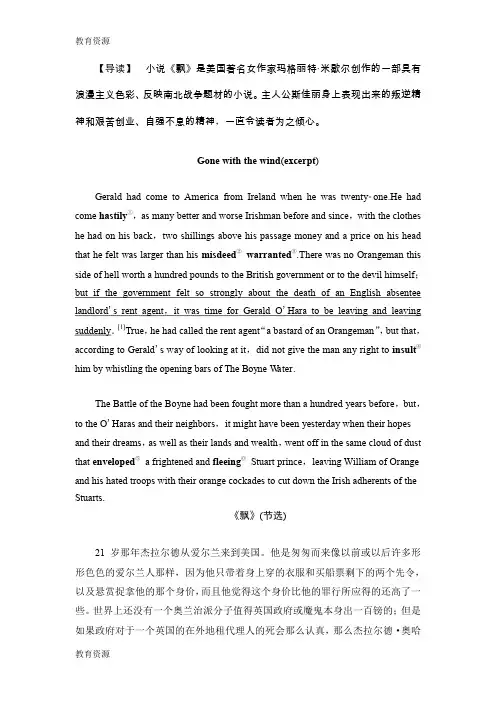
【导读】小说《飘》是美国著名女作家玛格丽特·米歇尔创作的一部具有浪漫主义色彩、反映南北战争题材的小说。
主人公斯佳丽身上表现出来的叛逆精神和艰苦创业、自强不息的精神,一直令读者为之倾心。
Gone with the wind(excerpt)Gerald had come to America from Ireland when he was twentyone.He had come hastily①,as many better and worse Irishman before and since,with the clothes he had on his back,two shillings above his passage money and a price on his head that he felt was larger than his misdeed②warranted③.There was no Orangeman this side of hell worth a hundred pounds to the British government or to the devil himself;but if the government felt so strongly about the death of an English absentee landlord's rent agent,it was time for Gerald O'Hara to be leaving and leaving suddenly.[1]True,he had called the rent agent“a bastard of an Orangeman”,but that,according to Gerald's way of looking at it,did not give the man any right to insult④him by whistling the opening bars of The Boyne Water.The Battle of the Boyne had been fought more than a hundred years before,but,to the O'Haras and their neighbors,it might have been yesterday when their hopes and their dreams,as well as their lands and wealth,went off in the same cloud of dust that enveloped⑤a frightened and fleeing⑥Stuart prince,leaving William of Orange and his hated troops with their orange cockades to cut down the Irish adherents of the Stuarts.《飘》(节选)21岁那年杰拉尔德从爱尔兰来到美国。
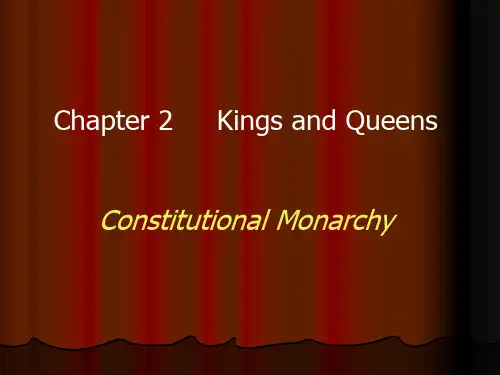
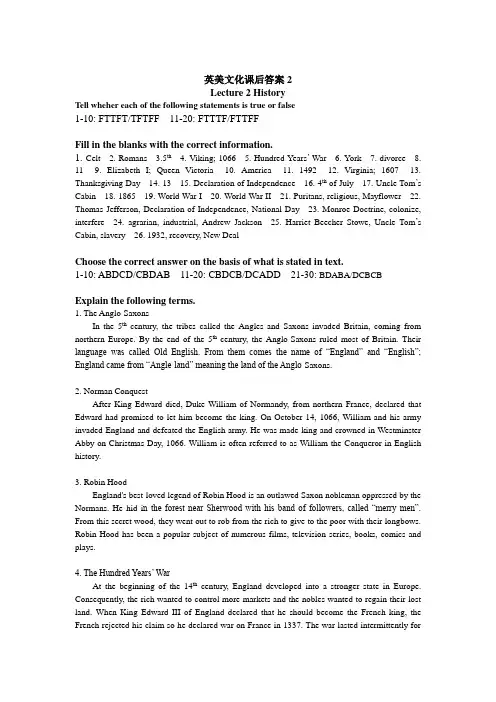
英美文化课后答案2Lecture 2 HistoryTell wheher each of the following statements is true or false1-10: FTTFT/TFTFF 11-20: FTTTF/FTTFFFill in the blanks with the correct information.1. Celt2. Romans3.5th4. Viking; 10665. Hundred Years’ War6. York7. divorce8.11 9. Elizabeth I; Queen Victoria 10. America 11. 1492 12. Virginia; 1607 13. Thanksgiving Day 14. 13 15. Declaration of Independence 16. 4th of July 17. Uncle Tom’s Cabin 18. 1865 19. World War I 20. World War II 21. Puritans, religious, Mayflower 22. Thomas Jefferson, Declaration of Independence, National Day 23. Monroe Doctrine, colonize, interfere 24. agrarian, industrial, Andrew Jackson 25. Harriet Beecher Stowe, Uncle Tom’s Cabin, slavery 26. 1932, recovery, New DealChoose the correct answer on the basis of what is stated in text.1-10: ABDCD/CBDAB 11-20: CBDCB/DCADD 21-30: BDABA/DCBCBExplain the following terms.1. The Anglo-SaxonsIn the 5th century, the tribes called the Angles and Saxons invaded Britain, coming from northern Europe. By the end of the 5th century, the Anglo-Saxons ruled most of Britain. Their language was called Old English. From them comes the name of “England” and “English”; England came from “Angle-land” meaning the land of the Anglo-Saxons.2. Norman ConquestAfter King Edward died, Duke William of Normandy, from northern France, declared that Edward had promised to let him become the king. On October 14, 1066, William and his army invaded England and defeated the English army. He was made king and crowned in Westminster Abby on Christmas Day, 1066. William is often referred to as William the Conqueror in English history.3. Robin HoodEngland's best-loved legend of Robin Hood is an outlawed Saxon nobleman oppressed by the Normans. He hid i n the forest near Sherwood with his band of followers, called “merry men”. From this secret wood, they went out to rob from the rich to give to the poor with their longbows. Robin Hood has been a popular subject of numerous films, television series, books, comics and plays.4. The Hundred Years’ WarAt the beginning of the 14th century, England developed into a stronger state in Europe. Consequently, the rich wanted to control more markets and the nobles wanted to regain their lost land. When King Edward III of England declared that he should become the French king, the French rejected his claim so he declared war on France in 1337. The war lasted intermittently for116 years, hence being known as the Hundred Years’ War.5. The Civil WarIn January 1642 the Civil War broke out between the Roundheads (supporters of Parliament) and the Cavaliers (supporters of the King). The Civil War ended with the Parliamentary victory and it led to the execution of Charles I, and his son Charles II was driven out of the country in 1649. In addition to that, Oliver Cromwell, the leader of the Roundheads,formed republican England, known as the Commonwealth of England and the English monarchy was abolished.6. American IndiansThe American Indians were the descendants of t he Mongoloid. The name “Indians” was given by Columbus when he mistook them for the people of India. It is believed that about 25,000 years ago the Indians crossed the Bering Strait land bridge to Alaska. The American Indians developed the brilliant civilizations of the Aztecs, the Incas and the Mayas.7. Columbus’ “discovery ” of AmericaIn 1492, Columbus persuaded the king and queen of Spain to finance his voyage. He believed that by sailing west from Europe, he could reach India. Columbus failed to reach India but landed at one of the Caribbean islands instead. He mistook these islands for part of India and called the local people Indians.8. The MayflowerThe Mayflower has a famous position in American history as a symbol of early European colonization. With their religion oppressed by the Church of England, in the autumn of 1620, 102 people sailed to the New World in a ship named the “Mayflower”. Late in December, the Mayflower finally landed in what is now Plymouth, Massachusetts.9. Declaration of IndependenceOn July 2, 1776, the Congress finally determined that these United Colonies ought to be free and independent states. Thomas Jefferson, assisted by Benjamin Franklin, drafted the Declaration of Independence, which the Congress adopted on July 4, 1776. It announced the independence of 13 North American colonies and the birth of a new nation.10. Abraham LincolnIn March 1861 Abraham Lincoln took the office of president. He realized that by making the war a battle against slavery, he could win support for the Union at home and abroad. On January 1, 1863, he issued the Emancipation Proclamation, which granted freedom to all slaves.11. William ShakespeareWilliam Shakespeare (1564-1616): English playwright and poet, whose body of works is considered as the greatest in English literature. His plays, many of which were performed at the Globe Theater in London, include historical works, comedies and tragedies. He also composed 154 sonnets and 36 plays.12. Sir Francis BaconSir Francis Bacon (1561-1626): English philosopher, essayist, courtier, jurist, and statesman. His writings include The Advancement of Learning (1605) and The Novum Organum (1620), in which he proposed a theory of scientific knowledge based on observation and experimentation that came to be known as the inductive method.13. Gunpowder PlotGunpowder Plot: Conspiracy of a group of English Catholics to blow up the Houses of parliament where King James I was present on 5 November, 1605. The plan was discovered and Guy Fawkes was caught and burnt alive. In England, 5 November is celebrated with bonfires, fireworks and the burning of the effigies.14. Great Fire of LondonGreat Fire of London (2-5 September, 1666): Worst fire in London’s history. It destroyed a large part of the city, including most of the civic buildings, St. Paul’s Cathedral, 87 parish churches, and about 13,000 houses. It began accidentally at the house of the king’s baker in Pudding Lane near London Bridge.15. Suez Canal CrisisSuez Canal Crisis: A major international incident that arose in 1956 from the decision by Gamal A. Nasser, President of Egypt, to nationalize the Suez Canal, which long had been controlled by Great Britain. After Nasser took over the canal, Britain and France induced Israel to provoke a conflict with Egypt that would serve as a pretext for an Anglo-French invasion of Egypt. The United States, which had been excluded from the planned invasion, denounced it. The incident severely damaged Anglo-American relations.16. John MajorJohn Major (1943- ): British banker and conservative politician, who served as Prime Minister from 1990 to 1997. during this administration, he advocated privatization, anti-inflationary budget discipline, and negotiations for peace in Northern Ireland.17. the First Continental CongressIn September 1774, 55 representatives from all the colonies except Georgia held a meeting in Philadelphia to talk about their troubles with their mother country. The meeting was called the First Continental Congress. At the meeting the majority of representatives still thought they could settle their quarrel with the British by peaceful means. They agreed to refuse to buy British goods, hoping in this way to force the British Government to give in to their demands. They also agreed to raise a volunteer army to protect the colonies if Britain used force to break the boycott.18. Louisiana PurchaseThe most glorious achievement of Jefferson as President was the Louisiana Purchase. The Louisiana Purchase, in 1803, gave Western farmer use of the important Mississippi River waterway, removed the French presence from the western border of US, provided US farmers with vast expanses of land, and furthered American leaders’ vision of creating a “Great Nation”.19. US-Spanish WarThe US-Spanish War broke out in April, 1898, lasted for only 70 days and ended with US as the victor. A peace treaty was signed in December 1898 in Paris. As a result of the war, Spain was forced to cede her former colonies Cuba, Puerto Rico, Guam and the Philippines to US; US agreed to pay 20 million dollars for them in an attempt to put a good face on its foreign expansion. Cuba remained a US “protectorate”for some years, while the Philippines were not granted its independence until after the end of WW I. US seized Hawaii from Spain after the US-Spanish War. The US-Spanish War was the first imperialist war for re-dividing the world. It marked a new stage in which US transformed into an imperialist power. From that time the US began its modern history.20. roaring twentiesThe expression of “roaring twenties” is often used to describe the period of American life. The roaring twenties ushered in an exciting time of social change and economic prosperity, as the recession at the end of WW II was quickly replaced by an unprecedented period of financial growth. The stock market soared to unimaginable heights because of the so-called Second Industrial Revolution at the turn of the 20th century, which saw the development of new inventions and machines that changed American society drastically.21. Wathergate ScandalIn the presidential election year 1972, five men of the Committee for the Reelection of the President broke into the Democratic national headquarters at the Water Hotel, Washington, D.C., where they planted bugs in order to get information for the Committee. But unfortunately they were arrested. Although it was never approved that Nixon planned the Watergate break-in or that he ever knew about it beforehand, he was eventually forced out of office because he was found guilty for his effort to avoid the investigation and disclosures.。
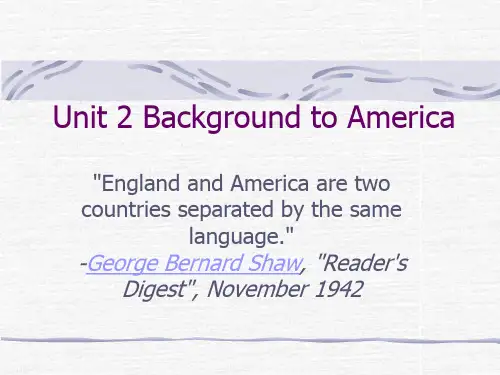
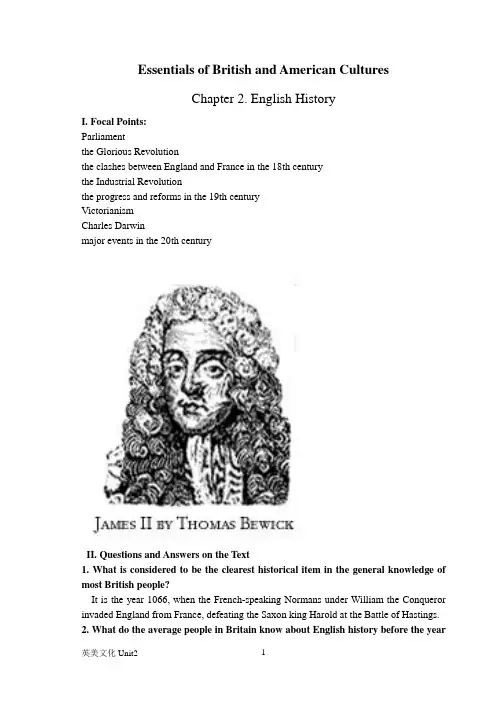
Essentials of British and American CulturesChapter 2. English HistoryI. Focal Points:Parliamentthe Glorious Revolutionthe clashes between England and France in the 18th centurythe Industrial Revolutionthe progress and reforms in the 19th centuryVictorianismCharles Darwinmajor events in the 20th centuryII. Questions and Answers on the Text1. What is considered to be the clearest historical item in the general knowledge of most British people?It is the year 1066, when the French-speaking Normans under William the Conqueror invaded England from France, defeating the Saxon king Harold at the Battle of Hastings.2. What do the average people in Britain know about English history before the year1066?They know about the Romans and they are sure to know the story of the fine Saxon king, Alfred the Great, and the legendary stories of the still earlier king Arthur and his Knights of the Round Table.3. Who was the most famous of the English Crusaders?The most famous of the English Crusaders was the Norman king, Richard Lion-Heart.4. In the Middle Ages, who were the great rivals of the king's authority?The great rivals of the king's authority were the Church and the powerful local chiefs, called barons.5.Why was the Pope in the Middle Ages so powerful?Because the Pope in Rome could always inspire the fear of eternal damnation by "excommunicating" (i. e. expelling from the Church) a king or even a whole nation; the Pope also wielded great political power over the whole of Western Europe.6.How did the French drive the English from their country at the end of the One-hundred-year War?The French drove the English from their country partly through the inspiration of the brave girl Joan of Arc, and partly through the effective use of guns, which had only just been invented.7. In English history, what language did the kings of the Middle Ages speak as their mother tongue? What changes took place after the Hundred Years' War?All the kings of the Middle Ages spoke French as their mother tongue. After the Hundred Years' War, England became completely severed from France, and the English language finally took the place of French in all classes of society.8.What were the characteristics of the sixteenth century as the beginning of the modern period in English history and European history?In the sixteenth century, the invention of printing made books much easier to produce and therefore much cheaper, so that ideas could spread quickly. It was the age of the great voyages of discovery and the beginning of the imperialist expansion; it was also the beginning of freedom of thought in the Christian religion.9.In the sixteenth century, what changes took place in religion?The sixteenth century was the beginning of the freedom of thought in the Christian religion, when the decline in the Pope's political power was followed by a decline in his religious authority.10. What was the result of the decline in the Pope's political power and religious authority in the sixteenth century?As a result of the decline in the Pope's political power and religious authority, Protestant churches sprang up in Northern Europe in opposition to the established Roman Catholic Church, and Protestant-Catholic hatred became a constant theme in European history.11. Who delivered the first great blow to the Roman Catholic Church in England?It was Henry VIII who delivered the first great blow to the Roman Catholic Church in England.12. How did the English Church break away from the central organization of Christianity?The long quarrel between the Pope and Henry VIII on the matter of Henry VIII's divorce ended in Henry VIII's declaring that he and not the Pope was the head of the Church in England. As a result, the English Church broke away from the central organization of Christianity.13. What is meant by "heresy" in the sixteenth century?It refers to any revolt against the traditional Christian faith. It was held by Catholics that "heresy" was the work of the devil and should be resisted by the most violent means.14. When did Protestantism gradually become the dominant faith in Britain?Protestantism gradually became the dominant faith in Britain in the reign of Elizabeth I, whose main interest lay in creating a strong united country in which there should be no more religious persecution.15. What were the characteristics of the Elizabethan age?It was an age of literature, especially the literature of Shakespeare, and an age of adventure on the sea.16. Which country was the biggest enemy of England in the sixteenth century?Spain was the biggest enemy of England in the sixteenth century.17. What was the most important event in the English history in the seventeenth century?The most important event in the English history in the seventeenth century was the English Revolution.18. What was the conflict between King Charles I and Parliament before the Civil War?Charles I believed he had a "Divine Right" to govern, while Rarliament believed he was a human being answerable to the people. For a time, Charles I actually ruled without parliament, and levied taxes without Parliament's approval.19. Who were the "Roundheads"? Why were they nicknamed "Roundheads" ?The "Roundheads" were the nickname of the "Puritan" elements, those with very strict Protestant principles. They were supporters of the Parliament. They were nicknamed the "Roundheads" because of the bare look of their shorn heads contrasted with the long, curly wigs of the King's more fashionable supporters, the "Cavaliers". 20. Who were the "Cavaliers"?The "Cavaliers" were the supporters of King Charles I, those who had long, curly wigs.21. Who was the Roundhead leader?The Roundhead leader was Oliver Cromwell.22. What was the consequence of the English Civil War?The Civil War led to the execution of Charles I and the temporary overthrow of the monarchy, when the country became for more than ten years a sort of republic founded by Oliver Cromwell.23. When did the Glorious Revolution take place?The Glorious Revolution took place in 1688.24. Who was the Britain's great enemy during the whole of the eighteenth century?Britain' s great enemy during the whole of the eighteenth century was France.25. What were the two most famous victories that Britain had over France during the eighteenth century?The two most famous victories were the Battle of Waterloo over the great Napoleon, and the Battle of Trafalgar over Napoleon' s fleet.26. What is meant by "meet one' s Waterloo"? What is the origin of the phrase?The phrase "meet one's Waterloo" means "encounter final disaster''. It comes from the Battle of Waterloo, the famous victory won by Britain over Napoleon.27. What is considered to be the most important event in the eighteenth century in Britain?The Industrial Revolution is considered to be the most important event in the eighteenth century in Britain.28. What was the most important invention during the Industrial Revolution?The most important invention during the Industrial Revolution was the invention of the steam engine.29. What was Britain's main historical interest after the Battle of Waterloo?Britain's main historical interest was in the efforts made (a) to overcome social problems, (b) to make Parliament more representative of the people, and (c) to improve local government and social services.30. What do "Peelers" or "bobbies" refer to?The word "Peeler" or "bobby" comes from the name of a person, Sir Robert ("Bobby") Peel, who founded the modern police force of Britain. So policemen are called "Peelers", or rather affectionately "bobbies."31. What is meant by "franchise"?Franchise means the right to vote in elections.32. How long did the Victorian age last?The Victorian age lasted 64 years from 1837 to 1901.33. What impact did Charles Darwin's The Origin of Species have on the Victorian age?Darwin's theory of evolution caused violent reaction from the religious Victorians who believed every deeply in God as the Creatorr of Man and in the life after death.Furious debates were Held both in private and in public, and Darwin's theory was destined to outlive Victorianism and contribute to its decay.34. How did the Victorian stability collapse after the death of Queen Victoria ?The Victorian stability collapsed within a few years of the death of Queen Victoria. The working classes rose up to fight for their rights and the women woke up to fight for the right to vote. Meanwhile the trouble in Ireland was going from bad to worse.35. According to the author, how did Britain get involved in World War I?Britain became involved because she had made friends with her old enemy, France, who was being attacked by Germany.36. What were the two most disasterous events in British economy between the two World Wars?They were the General Strike in 1926 and the great "slump" of the early 1930s.37. What became the threat of the international situation after the great "slump" ?After the great "slump", fascism became the threat of the international situation.38. Who were the two big fascists before and during the Second World War?The two big fascists were Mussolini in Italy and Hitler in Germany.39. What was the consequence of Hitler' s constant thirst for power?What was the basis of Hitler's constant thirst for power?Hitler's constant thirst {or power led Europe into the Second World War. The basis of Hitler's constant thirst for power was the idea of a German "master-race".40. How long did the First World War last? How long did the Second World War last?The First World War lasted 4 years from 1914 to 1918. The Second World War lasted 6 years from 1939 to 1945.41. What is meant by the "blitz" of 1940?It refers to the bombing of Britain by German planes in 1940, when Hitler sent his bombers day after day to bomb airfields and towns in the south, and then night after night, to bomb London.III. Explanations1.King HaroldThe Saxon king who was defeated and killed at the Battle of Hastings in 1066, when the French-speaking Normans under William the Conqueror invaded England from France.2. Alfred the Great(1)He was a fine Saxon king who successfully defeated the invading Danes.3. King Arthur( 1 ) He was the king of England in the sixth century. (2) Little was known about him,except that he was associated with Corn- wall and is the central figure of many legends about him and his Knights of the Round Table.4. The CrusadesThe Crusades were a series of wars in the Middle Ages in which armies from all over Europe tried to snatch the "Holy Land" ( i.e. Palestine, where Jesus Christ once lived) from the Infidels (i.e. the Muslims).5. Richard Lion-Heart( 1 ) He was a Norman king in the Middle Ages. (2) He was also the most famous of the English Crusaders at that time. (3) Many stories have been told about him and his enemy Saladin.6. the Magna Carta( 1 ) The Magna Carta (or Great Charter) was a document signed in 1215 by King John under compulsion by the powerful barons. (2) The purpose of the Charter was to make King John to recognize the rights of the barons. (3) The Magna Carta is now in the British Museum, London.7. the Hundred Years' War(1) A war between England and France which lasted, on and off, for a hundred years from 1337 to 1453. (2) It was fought entirely in France, and the whole of France very nearly fell into English hands in the famous battles of Crecy and Agincourt. (3) Eventually, partly through the inspiration of the brave girl Joan of Arc, and partly through the effective use of guns, the French drove the English from their land for good.8. Joan of Arc(1) She was a French saint and national heroine. (2) During the Hundred Years' War, her bravery and inspiration provided spirit and morale for French armies. (3) Later she was captured and burned at the stake.9. the Wars of the Roses(1) It is the name given to the struggle (1455--1485) for the throne of England between two branches of the English royal family: (2) the houses of Lancaster, whose badge was a red rose, and York, whose badge was a white rose. (3) The wars weakened both the nobility and the monarch.10. the Catholic Church(1) It refers to the Christian church headed by the Pope. (2) All members of the church accept the gospel of Christ and the teachings of the Bible. Any revolt against the traditional Christian faith was "heresy." (3) In the Middle Ages, the Pope was extremely powerful. (4) In the sixteenth century, some of the actual beliefs and practices of the Catholic Church Were questioned by Protestant doctrines and there was a great deal of presecution by Catholics.11. the Protestant Church( 1 ) It refers to the Christian church whose faith and practice originated with the principles of the Reformation. (2) As the Pope’s political power and religious authority declined in the sixteenth century, Protestant churches sprang up in Northern Europe in opposition to the established Roman Catholic Church. (3) In Britain, Protestantism gradually became the dominant faith in the Elizabethan age.12. bloody Mary( I ) It was the nickname given to Mary I, Henry III' s elder daughter. (2) She was a devout Catholic, and had so many Protestants burnt to death that she is remembered less by her official title Mary I than by her nickname Bloody Mary. (3) She was succeeded by Elizabeth I.13 the Elizabethan age(I) It refers to the period during the reign of Elizabeth I in British history. (2) It was an age of real literary achievement, especially that of Shakespeare, and (3) it was an age of adventure on the sea.14. the "Gunpowder Plot"(1) It refers to the most famous of a number of Catholic conspiracies in English history which occurred in the reign of James I (2) It was the plot to blow up the King and Parliament, in which a man called Guy Fawkes was caught in the cellars of the House of Commons in the very act of preparing the explosives. (3) "Guy Fawkes' Night" is still celebrated on November 5th each year.15. the English Civil War(1) One of the most important events in the whole of British history. (2) It is a bitter power struggle (1642--1648) between the monarchy and Parliament. (3) The victory of the Parliament led to the execution (1649) of Charles I and the temporary overthrow of the monarchy, and (4) the country became for more than ten years a sort of republic founded by Oliver Cromwell.16. King Charles I(1) An English king in the seventeenth century. He believed that he had a "Divine Right" to govern. (2) For a time, Charles actually ruled without Parliament, and levied taxes without Parliament's approval. (3) This aroused the opposition of the Roundheads , and the great Civil War broke out, in which he was defeated, tried as a traitor to his country, and condemned to death.17. Oliver Cromwell(1) Oliver Cromwell was the Roundhead leader during the English Civil War. (2) He defeated King Charles I and condemned him to death. (3) The monarchy was overthrown, and the country became for more than ten years a republic.18. the Glorious Revolution(1) It refers to the event of 1688 in the English Revolution, when the Catholicking James II was forced to flee with his baby son to France. (2) The throne was offered to his Protestant daughter and her husband Dutch king William. (3) The bill of Rights was passed by Parliament to restrict the power of the Monarchy. (4) This was the beginning of the Constitutional Monarchy in Britain.19. the Industrial Revolution( 1 ) It refers to the period in British history from 1750 to 1850. (2) Great changes took place with the invention of the steam engine. (3) More factories and big towns were built. (4) It made Britain stronger and richer, and at the same time it also created entirely new social class, the industrial workers.20. the Victorian age(I) It refers to the monarch of Britain under the great Queen Victoria from 1837 to 1901, the longest reign in British history. (2) The Victorian age was an age of national development and national optimism. (3) The Victorians were very religious and conservative in family life. (4) It was also, in its later stages, an age of imperialism.21. the "suffragette" movement( 1) A term refers to the movement in the early twentieth century by the British women, who had been meek and submissive in Victorian's reign. (2) They rose up to gain their right to vote. (3) This was not simply a political campaign but a profound revolt against an inferior status.22. Charles's Darwin( I ) The famous British scientist who wrote the important book "The Origin of Species". (2) His theory of evolution caused violent reaction of the Victorians against the book, and furious ,debates were held in private and in public. (3) Darwin's theory contributed to the decay of Victorianism.。
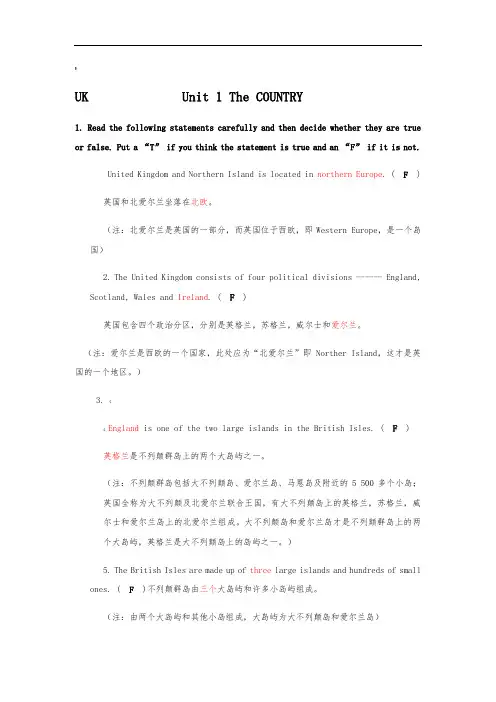
;UK Unit 1 The COUNTRY1. Read the following statements carefully and then decide whether they are true or false. Put a “T” if you think the statement is true and an “F” if it is not.United Kingdom and Northern Island is located in northern Europe. ( F )英国和北爱尔兰坐落在北欧。
(注:北爱尔兰是英国的一部分,而英国位于西欧,即Western Europe,是一个岛国)2.The United Kingdom consists of four political divisions ------ England,Scotland, Wales and Ireland. ( F )英国包含四个政治分区,分别是英格兰,苏格兰,威尔士和爱尔兰。
(注:爱尔兰是西欧的一个国家,此处应为“北爱尔兰”即Norther Island,这才是英国的一个地区。
)3.《4.England is one of the two large islands in the British Isles. ( F )英格兰是不列颠群岛上的两个大岛屿之一。
(注:不列颠群岛包括大不列颠岛、爱尔兰岛、马恩岛及附近的5 500多个小岛;英国全称为大不列颠及北爱尔兰联合王国,有大不列颠岛上的英格兰,苏格兰,威尔士和爱尔兰岛上的北爱尔兰组成。
大不列颠岛和爱尔兰岛才是不列颠群岛上的两个大岛屿,英格兰是大不列颠岛上的岛屿之一。
)5.The British Isles are made up of three large islands and hundreds of smallones. ( F )不列颠群岛由三个大岛屿和许多小岛屿组成。
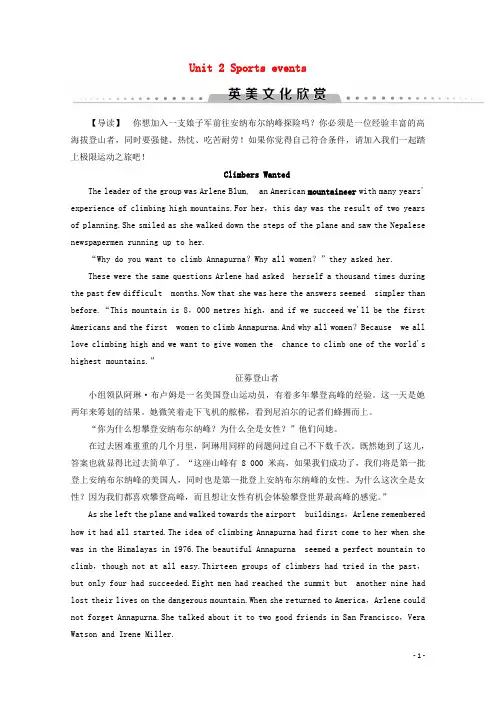
Unit 2 Sports events【导读】你想加入一支娘子军前往安纳布尔纳峰探险吗?你必须是一位经验丰富的高海拔登山者,同时要强健、热忱、吃苦耐劳!如果你觉得自己符合条件,请加入我们一起踏上极限运动之旅吧!Climbers WantedThe leader of the group was Arlene Blum, an American mountaineer with many years' experience of climbing high mountains.For her,this day was the result of two years of planning.She smiled as she walked down the steps of the plane and saw the Nepalese newspapermen running up to her.“Why do you want to climb Annapurna?Why all women?”they asked her.These were the same questions Arlene had asked herself a thousand times during the past few difficult months.Now that she was here the answers seemed simpler than before.“This mountain is 8,000 metres high,and if we succeed we'll be the first Americans and the first women to climb Annapurna.And why all women?Because we all love climbing high and we want to give women the chance to climb one of the world's highest mountains.”征募登山者小组领队阿琳·布卢姆是一名美国登山运动员,有着多年攀登高峰的经验。
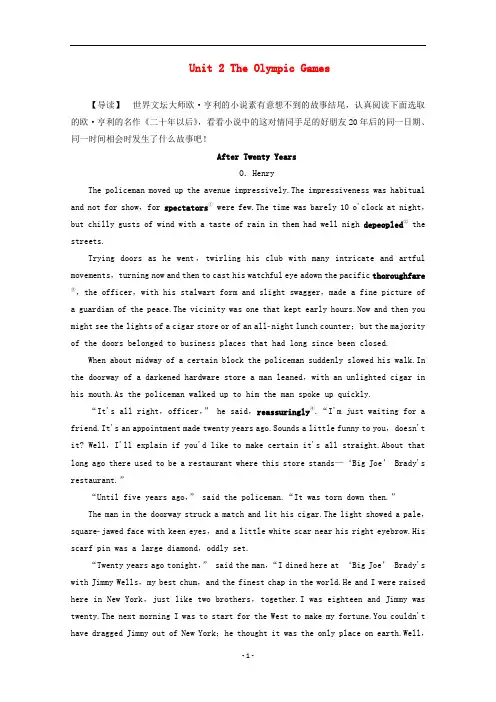
Unit 2 The Olympic Games【导读】世界文坛大师欧·亨利的小说素有意想不到的故事结尾,认真阅读下面选取的欧·亨利的名作《二十年以后》,看看小说中的这对情同手足的好朋友20年后的同一日期、同一时间相会时发生了什么故事吧!After Twenty YearsO.HenryThe policeman moved up the avenue impressively.The impressiveness was habitual and not for show,for spectators① were few.The time was barely 10 o'clock at night,but chilly gusts of wind with a taste of rain in them had well nigh depeopled② the streets.Trying doors as he went,twirling his club with many intricate and artful movements,turning now and then to cast his watchful eye adown the pacific thoroughfare③,the officer,with his stalwart form and slight swagger,made a fine picture ofa guardian of the peace.The vicinity was one that kept early hours.Now and then you might see the lights of a cigar store or of an allnight lunch counter;but the majority of the doors belonged to business places that had long since been closed.When about midway of a certain block the policeman suddenly slowed his walk.In the doorway of a darkened hardware store a man leaned,with an unlighted cigar in his mouth.As the policeman walked up to him the man spoke up quickly.“It's all right,officer,” he said,reassuringly④.“I'm just waiting for a friend.It's an appointment made twenty years ago.Sounds a little funny to you,doesn't it? Well,I'll explain if you'd like to make certain it's all straight.About that long ago there used to be a restaurant where this store stands—‘Big Joe’ Brady's restaurant.”“Until five years ago,” said the policeman.“It was torn down then.”The man in the doorway struck a match and lit his cigar.The light showed a pale,squarejawed face with keen eyes,and a little white scar near his right eyebrow.His scarf pin was a large diamond,oddly set.“Twenty years ago tonight,” said the man,“I dined here at ‘Big Joe’ Brady's with Jimmy Wells,my best chum,and the finest chap in the world.He and I were raised here in New York,just like two brothers,together.I was eighteen and Jimmy was twenty.The next morning I was to start for the West to make my fortune.You couldn't have dragged Jimmy out of New York;he thought it was the only place on earth.Well,we agreed that night that we would meet here again exactly twenty years from that date and time,no matter what our conditions might be or from what distance we might have to come.We figured that in twenty years each of us ought to have our destiny worked out and our fortunes made,whatever they were going to be.”“It sounds pretty interesting,” said the policeman.“Rather a long time between meets,though,it seems to me.Haven't you heard from your friend since you left?”“Well,yes,for a time we corresponded⑤,” said the other.“But after a year or two we lost track of each other.You see,the West is a pretty big proposition,and I kept hustling around over it pretty lively.But I know Jimmy will meet me here if he's alive,for he always was the truest old chap in the world.He'll never forget.I came a thousand miles to stand in this door tonight,and it's worth it if my old partner turns up.”The waiting man pulled out a handsome watch,the lids of it set with small diamonds.“Three minutes to ten,” he announced.“It was exactly ten o'clock when we parted here at the restaurant door.”“Did pretty well out West,didn't you?” asked the policeman.“You bet!I hope Jimmy has done half as well.He was a kind of plodder,though,good fellow as he was.I've had to compete with some of the sharpest wits going to get my pile.A man gets in a groove in New York.It takes the West to put a razoredge on him.”The policeman twirled his club and took a step or two.“I'll be on my way.Hope your friend comes around all right.Going to call time on him sharp?”“I should say not!” said the other.“I'll give him half an hour at least.If Jimmy is alive on earth he'll be here by that time.So long,officer.”“Good night,sir,” said the policeman,passing on along his beat,trying doors as he went.There was now a fine,cold drizzle falling,and the wind had risen from its uncertain puffs into a steady blow.The few foot passengers astir in that quarter hurried dismally ⑥ and silently along with coat collars turned high and pocketed hands.And in the door of the hardware store the man who had come a thousand miles to fill an appointment,uncertain almost to absurdity,with the friend of his youth,smoked his cigar and waited.About twenty minutes he waited,and then a tall man in a long overcoat,with collarturned up to his ears,hurried across from the opposite side of the street.He went directly to the waiting man.“Is that you,Bob?” he asked,doubtfully.“Is that you,Jimmy Wells?”cried the man in the door.“Bless my heart!” exclaimed the new arrival,grasping both the other's hands with his own.“It's Bob,sure as fate.I was certain I'd find you here if you were still in existence.Well,well,well!—twenty years is a long time.The old gone,Bob;I wish it had lasted,so we could have had another dinner there.How has the West treated you,old man?”二十年以后欧·亨利一名警察上了大街仔细搜索着,这种“仔细”已经习以为常了,不单纯是在表演,也不是有意做给为数不多的行人看的。

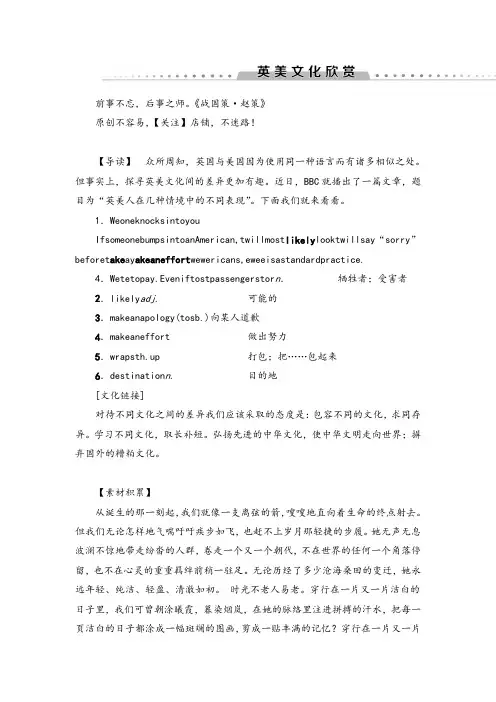
前事不忘,后事之师。
《战国策·赵策》原创不容易,【关注】店铺,不迷路!【导读】众所周知,英国与美国因为使用同一种语言而有诸多相似之处。
但事实上,探寻英美文化间的差异更加有趣。
近日,BBC就播出了一篇文章,题目为“英美人在几种情境中的不同表现”。
下面我们就来看看。
1.WeoneknocksintoyouIfsomeonebumpsintoanAmerican,twillmost likely looktwillsay“sorry”beforet ake ay akeaneffort wewericans,eweeisastandardpractice.4.Wetetopay.Eveniftostpassengerstor n.牺牲者;受害者2.likely adj. 可能的3.makeanapology(tosb.)向某人道歉4.makeaneffort 做出努力5.wrapsth.up 打包;把……包起来6.destination n. 目的地[文化链接]对待不同文化之间的差异我们应该采取的态度是:包容不同的文化,求同存异。
学习不同文化,取长补短。
弘扬先进的中华文化,使中华文明走向世界;摒弃国外的糟粕文化。
【素材积累】从诞生的那一刻起,我们就像一支离弦的箭,嗖嗖地直向着生命的终点射去。
但我们无论怎样地气喘吁吁疾步如飞,也赶不上岁月那轻捷的步履。
她无声无息波澜不惊地带走纷沓的人群,卷走一个又一个朝代,不在世界的任何一个角落停留,也不在心灵的重重羁绊前稍一驻足。
无论历经了多少沧海桑田的变迁,她永远年轻、纯洁、轻盈、清澈如初。
时光不老人易老。
穿行在一片又一片洁白的日子里,我们可曾朝涂曦霞,暮染烟岚,在她的脉络里注进拼搏的汗水,把每一页洁白的日子都涂成一幅斑斓的图画,剪成一贴丰满的记忆?穿行在一片又一片洁白的日子里,我们可曾删繁就简,除去芜杂的枝蔓,抖落发黄的往事,省略多余的情节,向着既定的目标轻装向前。
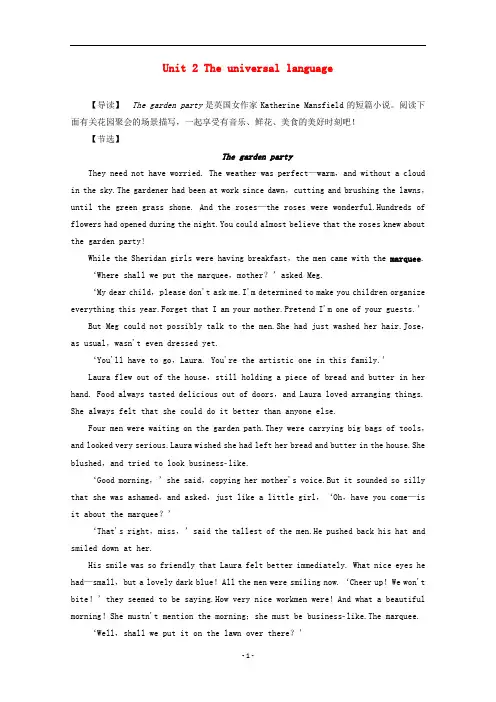
Unit 2 The universal language【导读】The garden party是英国女作家Katherine Mansfield的短篇小说。
阅读下面有关花园聚会的场景描写,一起享受有音乐、鲜花、美食的美好时刻吧!【节选】The garden partyThey need not have worried. The weather was perfect—warm,and without a cloud in the sky.The gardener had been at work since dawn,cutting and brushing the lawns,until the green grass shone. And the roses—the roses were wonderful.Hundreds of flowers had opened during the night.You could almost believe that the roses knew about the garden party!While the Sheridan girls were having breakfast,the men came with the marquee.‘Where shall we put the marquee,mother?’asked Meg.‘My dear child,please don't ask me.I'm determined to make you children organize everything this year.Forget that I am your mother.Pretend I'm one of y our guests.’But Meg could not possibly talk to the men.She had just washed her hair.Jose,as usual,wasn't even dressed yet.‘You'll have to go,Laura. You're the artistic one in this family.’Laura flew out of the house,still holding a piece of bread and butter in her hand. Food always tasted delicious out of doors,and Laura loved arranging things. She always felt that she could do it better than anyone else.Four men were waiting on the garden path.They were carrying big bags of tools,and looked very ura wished she had left her bread and butter in the house.She blushed,and tried to look businesslike.‘Good morning,’she said,copying her mother's voice.But it sounded so silly that she was ashamed,and asked,just like a little girl,‘Oh,have you come—is it about the marquee?’‘That's right,miss,’said the tallest of the men.He pushed back his hat and smiled down at her.His smile was so friendly that Laura felt better immediately. What nice eyes he had—small,but a lovely dark blue!All the men were smilin g now.‘Cheer up!We won't bite!’they seemed to be saying.How very nice workmen were!And what a beautiful morning!She mustn't mention the morning;she must be businesslike.The marquee.‘Well,shall we put it on the lawn over there?’She pointed with the hand that was not holding the bread and butter.They all turned and stared.The tall man frowned.‘I don't like it,’he said.‘You wouldn't notice it there.You see,with a thing like a marquee,you want it where it hits you—bang in the eye,as you might say.’Laura had been brought up in a way which made her wonder for a moment whether a workman should use an expression like‘bang in the eye’to her.But she understood what he meant.‘A corner of the tennis court,’she suggested.‘But the band's going to be in one corner.’‘Having a band,are you?’said another workman.He was pale,with a tired look in his dark eyes.What was he thinking?‘Only a very small band,’Laura said gently.Perhaps he wouldn't mind a very small band. But the tall man said,‘Look here,miss,that's the place.By those trees.Over there.’By the karaka trees.The marquee would hide them.And the karaka trees were so lovely,with their big,shiny leaves and orange fruit.Must they be hidden by a marquee?They must.The men were already carrying their bags of tools across the lawn.Only the tall man was left.Suddenly,he bent down touched a rose,and pulled it gently towards him to smell it.When Laura saw him do that,she forgot about the karakas.He was a workman who loved the perfume of roses.How many of the men that she knew cared about things like that?Oh,how nice workmen are,she thought.Why couldn't she have them for her friends,instead of the silly boys she danced with and who came to Sunday night supper?She liked these men much better.It's all the fault,she decided,of these stupid differences in social class.Well,for her there were no differences.Absolutely none at all,not a single one...And now there came the sound of hammers.Someone whistled,someone called out,‘Are you all right,mate?’‘Mate!’How friendly they were!Just to show how happy she was,how she liked being among these friendly men,Laura took a big bite out of her bread and butter. She felt just like a workgirl.‘Laura,Laura,where are you?Telephone,Laura!’a voice cried from the house.‘Coming!’She ran across the lawn,up the path and into the house.In the hall,her father and Laurie were brushing their hats,getting ready to go to the office.‘I say,Laura,’said Laurie,‘take a look at my coat,can you,before thisafternoon?I think it needs ironing.’‘All right,’she sa id.Suddenly,she couldn't stop herself.She ran up to Laurie and threw her arms around him.‘Oh,I do love parties,don't you!’she cried.‘I'll say I do!’said Laurie's warm,boyish voice.He gave his sister a gentle push.‘Run off to the phone,old girl.’The telep hone.‘Yes,yes;oh yes.Kitty?Good morning,e to lunch,my dear!It will be nothing special—just what's left over.Yes,isn't it a perfect morning?Yes,wear your white dress.One moment—mother is saying something.’Mrs Sheridan's voice floated down the stair s.‘Tell her to wear that sweet hat she wore last Sunday.’‘Mother says you must wear that sweet hat you wore last Sunday.Good.One o'clock.Byebye!’Laura put down the phone,took a deep breath,and stretched out her arms.Then she stood still,listening.The house was alive with sounds of running feet and distant voices.Somewhere down in the kitchen,a door opened and closed.Sunlight,and little warm winds,played in and out of the windows. Darling little winds.The doorbell rang,and she heard a man's voice and then Sadie saying,‘I'm sure I don't know.Wait.I'll ask Mrs Sheridan.’‘What is it,Sadie?’Laura came into the hall.‘The flowers have come from the shop,Miss Laura.’And there they were,by the door.Box after box,full of pots of pink lilies.No other kind. Nothing but lilies,big pink flowers,wide open and almost frighteningly alive.园会他们不必担心。
英美文化概论提纲Unit 1 a brief introduction to the united kingdom 1一 a brief introduction1.全称 The United Kingdom of Great Britain and northern Ireland--P17 III 12.构成England LondonScotland EdinburghWales CardiffNothern Ireland Belfast--P17 III23.历史A公元43世纪RomanB公元7世纪Anglo –saxons 安格鲁撒克逊人C 8世纪末阿尔弗雷德大帝King Alfred北欧海盗D 1066年诺曼征服NormansWilliam of NormandyBattle of HastingsKing Harold4.英国内战 civil war 资产阶级革命二Scotland1. Glasgow 最大城市 --P16 II 82. 大学15世纪 ancient and international university --P17 III 11三WalesUnlike England it did not fall to the Anglo-Saxon invaders of the 5th century --P16 II 11名词解释London:the largest city located in the south of the country .London is dominant in the UK in all fields;government finance and culture.London is one of the top three financial centers in the worldUnit 2 a brief introduction to the united kingdom iiNorthern Ireland1.宗教爱尔兰人是天主教徒 Catholics英国人是新教徒 Protestants--P33 I 62.1921年独立 Irish State (分水岭)3.爱尔兰南部26郡成立自由邦北部6 郡仍属英国—P34 II 104 .Loyalist 民族派希望加入爱尔兰共和国Unionist 联合派亲英国5.The official IRA 倾向于政治手段解决–P34 III 4The Provisional IRA 军事–P35 III 5“The Bullet and the Ballot Box”—P35 III 106.区分 Sinn Fein是政党 --P33 I 8/P35 III 11,121919 IRA是军事团体非政党7 .1973年 Power-Sharing mechanism权利分享机制—P34 II 88.1972 “Bloody Sunday”—P34 II 79.1985 Anglo-Irish agreement --P33 I 910. Downing –Street Declaration唐宁街宣言授权英军司令直接干预北爱治安事务名词解释1.”Home-rule”:1914年被签署成为法律。
C h a p t e r2H i s t o r yI. The Founding of the Nation1.1 Roman Britain and Anglo-Saxons1.1.1 Prehistoric Period (history undocumented)9,000 years ago part of E-Continent3,000 BC IberiansStonehenge1.1.2 Celtic Britain (8th—5th Century BC)The name of Britain—BritonsTribal societyCeltic Language(Irish Gaelic, Scottish Gaelic, Welsh)1.1.3 Roman Britain (43 AD—5th Century)First invasion—In August 55 BC, Julius Caesar invaded BritainSecond—Caesar's second raid in 54 BCThird and final—In 43 AD, Emperor Claudius, final and successful Roman invasion of BritainLeft—Germanic attack in Rome, forcing all Roman troops to leave Britain, and thus ending the Roman occupation of the island.1.1.3 Roman Britain (43 AD—5th Century)Capable administrators & good builders (towns and cities & roads) ▪Building of London, River Thames, “London Bridge”▪Building of roads1.1.4 The Anglo-Saxon Invasion (5th—8th Century)Germanic people(the Jutes from Jutland, Angles from South of Denmark and Saxons fromGermany)English (language of the Angles)dominant languageRoman ChristianitySt. Augustine brings Christianity to Britain from Rome and becomes Archbishop of Canterbury1.1.5 Danish Invasion (8th Century—1066)the Vikings (from the Scandinavian countries: Norway, Denmark and Sweden) Alfred the Great, king of Wessex▪A peace treaty: the eastern half of the island was to be subject to the Danish law and come to be known as the Danelaw▪From 1016 to 1042, under the rule of Danish kings.▪In 1042, the English throne was returned to the Anglo-Saxons▪Westminster Abbey, built in1052, by the penultimate King of England, Edward the Confessor (1042-1066)1.1.6 The Norman ConquestIn 1066, Edward died without an heir and Harold of Wessex became King in his place.Duke William, often referred to as William the Conquer, challenged Harold’s succession, won the Battle of Hastings, and was crowned King.In 1067, William started building the Tower of London, the greatfortress which demonstrated his power and dominated the city ofLondon.1.2.1 Great Charter (Magna Carta)In 1154 Henry II ascended the throneHenry II reformed the courts and the laws:▪introduced the jury system (陪审团制度)▪institutionalized common lawJohn ascended the throne in 1199. He demanded feudal taxes and army service.He was forced to sign the Magna Carta (大宪章).Significance▪townspeople—freedom of trade and self-government▪merchants and craftsmen—for the first time as a newpolitical force▪part of the British Constitution today1.2.2 Birth of ParliamentProvisions of Oxfordlimiting the King’s power by calling regular meetings of the GreatCouncilParler—to talkOfficial formation of the two houses of parliament:▪House of Lords▪House of Commons1.2.3 Hundred Years’ War (1337—1453)a series of wars fought between England and France over trade,territory, security and the throne▪promoted the concept of English nationalism.▪promoted the development of the textile industry▪raised the social position of the bourgeois class.1.2.4 The War of the Roses (1455—1485)A war for the throne between the House of York and the House ofLancaster.▪It reduced the power of nobility and helped to increase the power of the new rising bourgeois class.The House of Lancaster won and their leader Henry Tudor became King Henry VII and started the rule of the House of Tudor(1485-1603).II. Transition to the Modern Age2.1 Religious ReformationReasons—2 religious camps: Catholic and ProtestantImmediate cause: Henry VIII’s divorceAct of SupremacyHenry VIII—“only supreme head of the church of England”In essence, the Reformation was a political movement in a religious guise2.1 Religious ReformationQueen Elizabeth I (1558-1603)▪Consolidated the Church of England▪Defended the fruit of the Reformation in essence Golden Age of English History▪England advanced in such areas as foreign trade, exploration, literature, and the arts.▪The age of exploration began: claiming new lands for England and introducing new materials and foods.The American State, Virginia, is named after Queen Elizabeth.parliamentary clashes over monopolies▪the monarchy attempted to control commercial activities in the interests of the courtKing Charles I dissolved Parliament in 1629, and ruled the country without it for eleven years.The various classes in England soon split up into two camps: ▪Parliament: merchants, artisans and apprentices, peasants▪King: gentry, big landlords and monopolists2.2 The Civil WarThe civil war broke out (1642—1649)▪Between the Royalists (the Cavalier [保王党人]) andParliamentarians (Roundheads [圆颅党人])Result: the monarchy was abolished in 1649▪England was declared a commonwealth, i.e. a republic The Commonwealth (1649—1660)▪Cromwell, the head of the CommonwealthConservative in social reforms and protected propertyownership▪In 1660, Parliament had Charles II as king of England.▪This put an end to the Commonwealth.2.3 Restoration and the Glorious RevolutionRestoration:▪1661, Charles II: to restore the old social order▪1685, James II: to reestablish CatholicismGlorious Revolution▪1688: joint sovereign of William and Mary▪1689: Bill of Rights (limited the power of the monarch and guaranteed the authority of Parliament ) removed the ruling monarchand established Constitutional Monarchy2.4 The Industrial RevolutionThe Industrial Revolution took place first in Britain for the following reasons▪huge market▪colonies in America and India—capital▪enclosure movement—laborA series of important inventions in the textile industry marked thebeginning of Industrial Revolution:▪Spinning Jenny▪Water frame▪Spinning mule▪Power loom▪Steam engineMeans of transportation▪canals were dug to ship goods▪the locomotive invented in 1814▪the first railway completed in 1825▪large merchant fleetBy the middle of 19th century, the Industrial Revolution was accomplished in BritainIts influence: Britain changed in many ways▪dramatically increased industrial productivity▪the process of urbanization▪changes in class structure▪The conflict between the capitalists and the proletarians—the most important political issueIII. The Rise and Fall of the British Empire3.1 The Formation of the British EmpireFirst British Empire: 19th Century▪It included the colonies in Canada, Australia, New Zealand, India and many small states in the West IndiesSecond British Empire during the Victorian Age: Mid- and late-19th Century▪Queen Victoria’s foreign policy—New ImperialismIt included the colonies in Australia, New Zealand and Canada—dominionsVictoria—“Empress of India”In Asia, occupied Burma and some other small states.Opium War against ChinaIn Africa, control Suez Canal and conquer EgyptUnion of South Africa—the 4th dominion On the Eve of World War I, Britain had the largest colonial empire the world had ever seen.▪ a territory of 33.5 million square kilometers (1/4 of the world’s total land).▪ a population of 393.5 million (8 times as large as that in Britain)▪An empire on which the sun never set3.2 Britain in the World Wars3.2.1 World War IBy the beginning of the 20th centur y, Britain’s dominance was challenged by other European nations and the USTwo camps in Europe:▪Central Powers: Germany, Austria-Hungary, Ottoman Empire and Bulgaria▪Allied Powers: Britain, France, Russia, Italy and US The immediate cause—assassination in SarajevoOver 32 countries were involved, 28 of which support the Allies Powers and Allies Powers wonThe cost of the war for Britain was great:▪drained of its manpower▪lost the sea supremacy▪ a huge national debt3.2.2 World War IIGermany—plan to conquer EuropeBritain—appeasementdeclare war on Germany on September 3, 1939alliance with the Soviet Union and the United StatesGermany surrendered unconditionally on May 7, 1945great cost—lose its navalsupremacy and in debt tothe United States.3.3 The Fall of the EmpireIndependence movement—India, Pakistan, Burma, Malaya and EgyptBritish Commonwealth of Nations (a loosely organized community of former British colonies)IV. Britain since World War II4.1. “Three Majestic Circles”One of the Big Three after WWIIForeign Policy: Three Majestic Circles▪less involvement in the Commonwealth circle▪close cooperation with the United States▪an isolationist policy towards Europe4.2 “Special Relationship” with the USMargaret Thatcher▪Reestablished “special relationship” with the United States▪against European integrationTony Blair▪more positive towards Europe (but refuse to join the Euro)▪further strengthened the close relationship with the United States。
Unit 2 Sports And Fitness【导读】《飘》绝对是一部值得再三品味的好书,文字优美,情节跌荡起伏、扣人心弦,虽然其中由于作者的主观因素,对于美国南北战争的评价并不客观和全面,但以文学角度来说,这绝对是一部绝世佳作,值得一看。
Gone with the Wind(Excerpt)It seemed strange now that when she was growing up Ashley had never seemed so attractive to her.In childhood days,she had seen him come and go and never given him a thought.But since that day two years ago when Ashley,newly home from his three years' Grand Tour in Europe,had called to pay his respects,she had loved him.It was as simple as that.She had been on the front porch and he had ridden up the long avenue,dressed in gray broadcloth with a wide black cravat setting off his frilled shirt to perfection.Even now,she could recall each detail of his dress,how brightly his boots shone,the head of a Medusa in cameo on his cravat phi,the wide Panama hat that was instantly in his hand when he saw her.He had alighted and tossed his bridle reins to a pickaninny and stood looking up at her,his drowsy gray eyes wide with a smile and the sun so bright on his blond hair that it seemed like a cap of shining silver.And he said,“So you've grown up,Scarlett.” And,coming lightly up the steps,he had kissed her hand.And his voice! She would never forget the leap of her heart as she heard it,as if for the first time,drawling,resonant,musical.She had wanted him,in that first instant,wanted him as simply and unreasoningly as she wanted food to eat,horses to ride and a soft bed on which to lay herself.飘(节选)现在看来很有些奇怪,当她还没有长大成人的时候,为什么从不觉得艾希礼有什么动人之处呢?童年时,她看见他走来走去,可一次也不曾想过他。
Essentials of British and American CulturesChapter 2. English HistoryI. Focal Points:Parliamentthe Glorious Revolutionthe clashes between England and France in the 18th centurythe Industrial Revolutionthe progress and reforms in the 19th centuryVictorianismCharles Darwinmajor events in the 20th centuryII. Questions and Answers on the Text1. What is considered to be the clearest historical item in the general knowledge of most British people?It is the year 1066, when the French-speaking Normans under William the Conqueror invaded England from France, defeating the Saxon king Harold at the Battle of Hastings.2. What do the average people in Britain know about English history before the year1066?They know about the Romans and they are sure to know the story of the fine Saxon king, Alfred the Great, and the legendary stories of the still earlier king Arthur and his Knights of the Round Table.3. Who was the most famous of the English Crusaders?The most famous of the English Crusaders was the Norman king, Richard Lion-Heart.4. In the Middle Ages, who were the great rivals of the king's authority?The great rivals of the king's authority were the Church and the powerful local chiefs, called barons.5.Why was the Pope in the Middle Ages so powerful?Because the Pope in Rome could always inspire the fear of eternal damnation by "excommunicating" (i. e. expelling from the Church) a king or even a whole nation; the Pope also wielded great political power over the whole of Western Europe.6.How did the French drive the English from their country at the end of the One-hundred-year War?The French drove the English from their country partly through the inspiration of the brave girl Joan of Arc, and partly through the effective use of guns, which had only just been invented.7. In English history, what language did the kings of the Middle Ages speak as their mother tongue? What changes took place after the Hundred Years' War?All the kings of the Middle Ages spoke French as their mother tongue. After the Hundred Years' War, England became completely severed from France, and the English language finally took the place of French in all classes of society.8.What were the characteristics of the sixteenth century as the beginning of the modern period in English history and European history?In the sixteenth century, the invention of printing made books much easier to produce and therefore much cheaper, so that ideas could spread quickly. It was the age of the great voyages of discovery and the beginning of the imperialist expansion; it was also the beginning of freedom of thought in the Christian religion.9.In the sixteenth century, what changes took place in religion?The sixteenth century was the beginning of the freedom of thought in the Christian religion, when the decline in the Pope's political power was followed by a decline in his religious authority.10. What was the result of the decline in the Pope's political power and religious authority in the sixteenth century?As a result of the decline in the Pope's political power and religious authority, Protestant churches sprang up in Northern Europe in opposition to the established Roman Catholic Church, and Protestant-Catholic hatred became a constant theme in European history.11. Who delivered the first great blow to the Roman Catholic Church in England?It was Henry VIII who delivered the first great blow to the Roman Catholic Church in England.12. How did the English Church break away from the central organization of Christianity?The long quarrel between the Pope and Henry VIII on the matter of Henry VIII's divorce ended in Henry VIII's declaring that he and not the Pope was the head of the Church in England. As a result, the English Church broke away from the central organization of Christianity.13. What is meant by "heresy" in the sixteenth century?It refers to any revolt against the traditional Christian faith. It was held by Catholics that "heresy" was the work of the devil and should be resisted by the most violent means.14. When did Protestantism gradually become the dominant faith in Britain?Protestantism gradually became the dominant faith in Britain in the reign of Elizabeth I, whose main interest lay in creating a strong united country in which there should be no more religious persecution.15. What were the characteristics of the Elizabethan age?It was an age of literature, especially the literature of Shakespeare, and an age of adventure on the sea.16. Which country was the biggest enemy of England in the sixteenth century?Spain was the biggest enemy of England in the sixteenth century.17. What was the most important event in the English history in the seventeenth century?The most important event in the English history in the seventeenth century was the English Revolution.18. What was the conflict between King Charles I and Parliament before the Civil War?Charles I believed he had a "Divine Right" to govern, while Rarliament believed he was a human being answerable to the people. For a time, Charles I actually ruled without parliament, and levied taxes without Parliament's approval.19. Who were the "Roundheads"? Why were they nicknamed "Roundheads" ?The "Roundheads" were the nickname of the "Puritan" elements, those with very strict Protestant principles. They were supporters of the Parliament. They were nicknamed the "Roundheads" because of the bare look of their shorn heads contrasted with the long, curly wigs of the King's more fashionable supporters, the "Cavaliers". 20. Who were the "Cavaliers"?The "Cavaliers" were the supporters of King Charles I, those who had long, curly wigs.21. Who was the Roundhead leader?The Roundhead leader was Oliver Cromwell.22. What was the consequence of the English Civil War?The Civil War led to the execution of Charles I and the temporary overthrow of the monarchy, when the country became for more than ten years a sort of republic founded by Oliver Cromwell.23. When did the Glorious Revolution take place?The Glorious Revolution took place in 1688.24. Who was the Britain's great enemy during the whole of the eighteenth century?Britain' s great enemy during the whole of the eighteenth century was France.25. What were the two most famous victories that Britain had over France during the eighteenth century?The two most famous victories were the Battle of Waterloo over the great Napoleon, and the Battle of Trafalgar over Napoleon' s fleet.26. What is meant by "meet one' s Waterloo"? What is the origin of the phrase?The phrase "meet one's Waterloo" means "encounter final disaster''. It comes from the Battle of Waterloo, the famous victory won by Britain over Napoleon.27. What is considered to be the most important event in the eighteenth century in Britain?The Industrial Revolution is considered to be the most important event in the eighteenth century in Britain.28. What was the most important invention during the Industrial Revolution?The most important invention during the Industrial Revolution was the invention of the steam engine.29. What was Britain's main historical interest after the Battle of Waterloo?Britain's main historical interest was in the efforts made (a) to overcome social problems, (b) to make Parliament more representative of the people, and (c) to improve local government and social services.30. What do "Peelers" or "bobbies" refer to?The word "Peeler" or "bobby" comes from the name of a person, Sir Robert ("Bobby") Peel, who founded the modern police force of Britain. So policemen are called "Peelers", or rather affectionately "bobbies."31. What is meant by "franchise"?Franchise means the right to vote in elections.32. How long did the Victorian age last?The Victorian age lasted 64 years from 1837 to 1901.33. What impact did Charles Darwin's The Origin of Species have on the Victorian age?Darwin's theory of evolution caused violent reaction from the religious Victorians who believed every deeply in God as the Creatorr of Man and in the life after death.Furious debates were Held both in private and in public, and Darwin's theory was destined to outlive Victorianism and contribute to its decay.34. How did the Victorian stability collapse after the death of Queen Victoria ?The Victorian stability collapsed within a few years of the death of Queen Victoria. The working classes rose up to fight for their rights and the women woke up to fight for the right to vote. Meanwhile the trouble in Ireland was going from bad to worse.35. According to the author, how did Britain get involved in World War I?Britain became involved because she had made friends with her old enemy, France, who was being attacked by Germany.36. What were the two most disasterous events in British economy between the two World Wars?They were the General Strike in 1926 and the great "slump" of the early 1930s.37. What became the threat of the international situation after the great "slump" ?After the great "slump", fascism became the threat of the international situation.38. Who were the two big fascists before and during the Second World War?The two big fascists were Mussolini in Italy and Hitler in Germany.39. What was the consequence of Hitler' s constant thirst for power?What was the basis of Hitler's constant thirst for power?Hitler's constant thirst {or power led Europe into the Second World War. The basis of Hitler's constant thirst for power was the idea of a German "master-race".40. How long did the First World War last? How long did the Second World War last?The First World War lasted 4 years from 1914 to 1918. The Second World War lasted 6 years from 1939 to 1945.41. What is meant by the "blitz" of 1940?It refers to the bombing of Britain by German planes in 1940, when Hitler sent his bombers day after day to bomb airfields and towns in the south, and then night after night, to bomb London.III. Explanations1.King HaroldThe Saxon king who was defeated and killed at the Battle of Hastings in 1066, when the French-speaking Normans under William the Conqueror invaded England from France.2. Alfred the Great(1)He was a fine Saxon king who successfully defeated the invading Danes.3. King Arthur( 1 ) He was the king of England in the sixth century. (2) Little was known about him,except that he was associated with Corn- wall and is the central figure of many legends about him and his Knights of the Round Table.4. The CrusadesThe Crusades were a series of wars in the Middle Ages in which armies from all over Europe tried to snatch the "Holy Land" ( i.e. Palestine, where Jesus Christ once lived) from the Infidels (i.e. the Muslims).5. Richard Lion-Heart( 1 ) He was a Norman king in the Middle Ages. (2) He was also the most famous of the English Crusaders at that time. (3) Many stories have been told about him and his enemy Saladin.6. the Magna Carta( 1 ) The Magna Carta (or Great Charter) was a document signed in 1215 by King John under compulsion by the powerful barons. (2) The purpose of the Charter was to make King John to recognize the rights of the barons. (3) The Magna Carta is now in the British Museum, London.7. the Hundred Years' War(1) A war between England and France which lasted, on and off, for a hundred years from 1337 to 1453. (2) It was fought entirely in France, and the whole of France very nearly fell into English hands in the famous battles of Crecy and Agincourt. (3) Eventually, partly through the inspiration of the brave girl Joan of Arc, and partly through the effective use of guns, the French drove the English from their land for good.8. Joan of Arc(1) She was a French saint and national heroine. (2) During the Hundred Years' War, her bravery and inspiration provided spirit and morale for French armies. (3) Later she was captured and burned at the stake.9. the Wars of the Roses(1) It is the name given to the struggle (1455--1485) for the throne of England between two branches of the English royal family: (2) the houses of Lancaster, whose badge was a red rose, and York, whose badge was a white rose. (3) The wars weakened both the nobility and the monarch.10. the Catholic Church(1) It refers to the Christian church headed by the Pope. (2) All members of the church accept the gospel of Christ and the teachings of the Bible. Any revolt against the traditional Christian faith was "heresy." (3) In the Middle Ages, the Pope was extremely powerful. (4) In the sixteenth century, some of the actual beliefs and practices of the Catholic Church Were questioned by Protestant doctrines and there was a great deal of presecution by Catholics.11. the Protestant Church( 1 ) It refers to the Christian church whose faith and practice originated with the principles of the Reformation. (2) As the Pope’s political power and religious authority declined in the sixteenth century, Protestant churches sprang up in Northern Europe in opposition to the established Roman Catholic Church. (3) In Britain, Protestantism gradually became the dominant faith in the Elizabethan age.12. bloody Mary( I ) It was the nickname given to Mary I, Henry III' s elder daughter. (2) She was a devout Catholic, and had so many Protestants burnt to death that she is remembered less by her official title Mary I than by her nickname Bloody Mary. (3) She was succeeded by Elizabeth I.13 the Elizabethan age(I) It refers to the period during the reign of Elizabeth I in British history. (2) It was an age of real literary achievement, especially that of Shakespeare, and (3) it was an age of adventure on the sea.14. the "Gunpowder Plot"(1) It refers to the most famous of a number of Catholic conspiracies in English history which occurred in the reign of James I (2) It was the plot to blow up the King and Parliament, in which a man called Guy Fawkes was caught in the cellars of the House of Commons in the very act of preparing the explosives. (3) "Guy Fawkes' Night" is still celebrated on November 5th each year.15. the English Civil War(1) One of the most important events in the whole of British history. (2) It is a bitter power struggle (1642--1648) between the monarchy and Parliament. (3) The victory of the Parliament led to the execution (1649) of Charles I and the temporary overthrow of the monarchy, and (4) the country became for more than ten years a sort of republic founded by Oliver Cromwell.16. King Charles I(1) An English king in the seventeenth century. He believed that he had a "Divine Right" to govern. (2) For a time, Charles actually ruled without Parliament, and levied taxes without Parliament's approval. (3) This aroused the opposition of the Roundheads , and the great Civil War broke out, in which he was defeated, tried as a traitor to his country, and condemned to death.17. Oliver Cromwell(1) Oliver Cromwell was the Roundhead leader during the English Civil War. (2) He defeated King Charles I and condemned him to death. (3) The monarchy was overthrown, and the country became for more than ten years a republic.18. the Glorious Revolution(1) It refers to the event of 1688 in the English Revolution, when the Catholicking James II was forced to flee with his baby son to France. (2) The throne was offered to his Protestant daughter and her husband Dutch king William. (3) The bill of Rights was passed by Parliament to restrict the power of the Monarchy. (4) This was the beginning of the Constitutional Monarchy in Britain.19. the Industrial Revolution( 1 ) It refers to the period in British history from 1750 to 1850. (2) Great changes took place with the invention of the steam engine. (3) More factories and big towns were built. (4) It made Britain stronger and richer, and at the same time it also created entirely new social class, the industrial workers.20. the Victorian age(I) It refers to the monarch of Britain under the great Queen Victoria from 1837 to 1901, the longest reign in British history. (2) The Victorian age was an age of national development and national optimism. (3) The Victorians were very religious and conservative in family life. (4) It was also, in its later stages, an age of imperialism.21. the "suffragette" movement( 1) A term refers to the movement in the early twentieth century by the British women, who had been meek and submissive in Victorian's reign. (2) They rose up to gain their right to vote. (3) This was not simply a political campaign but a profound revolt against an inferior status.22. Charles's Darwin( I ) The famous British scientist who wrote the important book "The Origin of Species". (2) His theory of evolution caused violent reaction of the Victorians against the book, and furious ,debates were held in private and in public. (3) Darwin's theory contributed to the decay of Victorianism.。